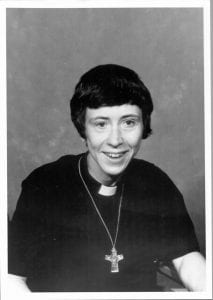Barbara Andrews

Photo used with permission of the ELCA Archives.
On December 22nd, 1970, Barbara Andrews became the first woman ordained within the ALC. A graduate of Luther Seminary, Andrews was fully trained before the ALC convention and had been working where she could — in campus ministry at the University of Minnesota-St. Paul. She was ready to pursue her calling as a hospital chaplain as soon as the church would allow her to be ordained. She received a call from the church she had attended as a child, Edina Community Lutheran Church. Reported in the October, 1970 congregational newsletter, the church did not have the need or the resources to support an assistant pastor, but they decided, as a congregation, to still provide the call. Their call to ordination allowed Andrews to then begin a career in hospital chaplaincy.
Not only was Andrews the first woman ordained within the ALC, but she was also the first ordained wheelchair-bound woman across all Lutheran churches in America. At different times in her life, Andrews emphasized different parts of her identity, so her disability was not always emphasized. In a 1970 interview with the Minneapolis Star, Andrews stated, “[my] disability is not as much a handicap as my womanhood, but it’s a good back-up to arguments against employing me.” At this time, when women’s ordination was not yet approved, Andrews’ identity as a woman was much more damaging to her aspirations of chaplaincy than her wheelchair. While some people would be unsure about having a pastor in a wheelchair, even more were unsure or unable to have a female pastor.
In some points of her life, Andrews saw her wheelchair as an asset to her ministry. She felt spiritually called to hospital chaplaincy, as her wheelchair made her more relatable to the patients. She understood physical suffering and could be more comforting to a patient in distress. Andrews also emphasized the difference between a chaplain standing beside a bed and speaking over a patient, compared to her, as a chaplain, seated beside a bed and speaking directly to a patient. In her ministry, Andrews was called to support those suffering against bodily limitations and illnesses, much in the way that she did on a daily basis.
At other times, Andrews mentioned neither her identity as a woman nor her wheelchair. In her response to her ordination, Andrews discusses ministry and emphasized the Lutheran community, saying “I fight the same battles you do. Maybe we can face our dilemmas more constructively if we faced them together.” Like other ordained women, she wanted people to look at her and see her spiritual call, not the embodiment of a political statement. Because, whatever her other identities and roles may have been, Andrews’ primary role was pastor and chaplain.
In 1978, Andrews died while fighting a fire in her Detroit apartment. Andrews’ short-lived ministry left few sources that can be used to learn about her life. However, from what little remains, it is clear that she was called to a specific ministry and wished to provide counsel and comfort to those who were suffering the most.
References
“Ban on Ordaining Women: Chaplaincy Eludes Palsey Victim.” Minneapolis Star. March 12, 1970. ELCA Archives.
“Special Congregational Meeting, November 8.” The Candle: Newsletter of Edina Community Lutheran Church 10, no. 15 (October 21, 1970). ELCA Archives, TALC 4/2/3 The American Lutheran Church (1961-1987) General President, The Rev. Fredrik A. Schiotz, Church Council Records, 1958-1970 Box 3, folder 9 “Church Council: Ordination of Women I, 1967-1970).
Thompson, Susan. “Barbara Andrews.” In Lutheran Women in Ordained Ministry, 1970-1995, edited by Gloria E. Bengtson, 52–58. Minneapolis: Augsburg Fortress, 1995.
